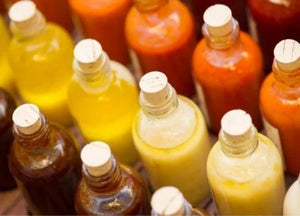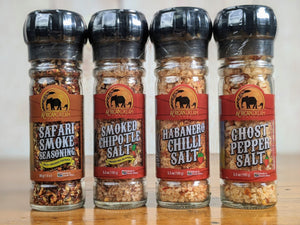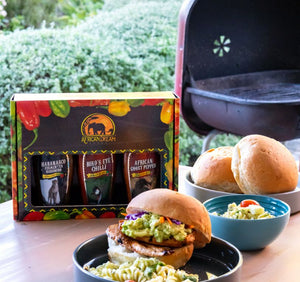6 Mind-Blowing Facts On How To Keep Your Hot Sauce Fresh
Oct 04, 2021
Whether you’re an every day, every meal hot sauce connoisseur, or simply enjoy the occasional dab of spice here and there you’ve probably wondered “Does hot sauce go bad?” The short answer—yes. See this as a PSA: hot sauce, like most foods, goes bad.
But don’t give up on your beloved condiment just yet, there are many ways to prolong the life of hot sauce. Although we know that most hot sauces won’t stay unopened and unfinished for long, we’ve broken down the tips, tricks, and ‘rules’ to storing hot sauce safely and to ensure it lasts until the very last drop.
Why does food go bad?
Let’s face it, all food spoils eventually (except for honey, so crazy!), but some foods have a longer shelf life than others. Everyone knows that the fresh punnet of strawberries from the local farmer’s market will spoil more quickly than those canned peaches in the backwaters of your pantry, which you will definitely use one day. The point is, different foods spoil at completely different rates, and a lot of this depends on storage conditions.
4 Reasons for Food Spoilage (and how to prevent them)
1. Oxidation – As soon as your food comes into contact with air, oxidation starts to occur. This means that the food immediately starts to break down and decay, affecting the taste color, and nutritional value of the food. So make sure to whip out that Tupperware, or better yet, glass jars, for some airtight storage solutions. When it comes to hot sauce, you will notice a change in color when oxidation occurs, stick it in the fridge to help with this!
2. Enzymes – Ever wonder why your bananas seem to brown overnight, while your carrots last in your fridge for ages? Well, this is something to do with their enzymatic structure which determines how food ripens and how it affects their flavor and coloring. That is why hot sauces that contain fruits tend to have shorter shelf lives than those that don’t. There is, unfortunately, no way to prevent the natural process of food ripening, but by learning the proper storage methods of various foods it definitely helps! Some tricks of the trade include keeping your food in good containers, storing cooked food above raw food, and eliminating moisture from your fruit and veggies.
3. Temperature – Changes in temperature can speed up the decaying process 10-fold! Your yummy treats stored in pantries should be kept between 50 and 70 F, while refrigerated goods should be kept between 34 and 40 F. Items kept in your freezer should remain below the freezing level until you are ready to cook with them. We don’t recommend freezing your hot sauce, but keeping it in the fridge will prevent temperature changes, and then it will last longer. When food reaches higher temperatures, they deteriorate exponentially quicker due to the growth of microorganisms (such as molds, yeast, and bacteria).
4. Physical Damage – Store a half-eaten avocado in the fridge and it will spoil much quicker than a whole one, and this same logic applies to almost all ingredients. If you break or damage the exterior layer or break the food’s surface, you introduce the risk of bacterial growth. So make sure you handle your ingredients carefully and that they are appropriately packaged to prevent breaking that physical barrier. When it comes to your favorite sauce, the physical barrier is the lid, so make sure you keep that cap tight on your bottle as soon as you are finished using it.
Now let’s get to the six hot tips of keeping that hot sauce as fresh as can be:
1. Keep it in the fridge

An often debated topic is whether to keep hot sauce in the fridge or not. Generally speaking, unopened hot sauce doesn’t need to be kept in the fridge because capsaicin, the active component in chili peppers, keeps bacteria at bay. However, there are still several factors to consider. Namely, the ingredient list.
Sauces that are vinegar, salt, and garlic heavy don’t necessarily need refrigeration as these ingredients are natural food preservers. While sugary, fruity, or especially egg-based sauces (think Sriracha mayo) are more susceptible to spoilage and should be refrigerated after being opened. We do however suggest checking the label as each sauce has its own guidelines and recommendations.
SHOP NOW: LEMON & GARLIC PERI-PERI HOT SAUCE
There are many benefits to refrigerating your hot sauce:
- Pantry stored unopened hot sauce can last up to six months, while refrigerated unopened hot sauce lasts up to four times longer. A general rule depending on the sauce’s ingredients.It will keep your hot sauce looking good.
- If you don’t store your hot sauce (opened or unopened) in the fridge it will darken in color due to oxidation and nobody wants a potent, bright red sauce, turning to a dull maroon, or your beautiful habanero yellow hot sauce taking on a greyish hue. Although, many spice-heads consider this a worthy trade-off as they swear that keeping hot sauce in the fridge reduces its flavor.
- It is important to note that there is no scientific backing to this and it has been proven that the Scoville Scale (the heat scale used to determine the spiciness of foods) is no different before or after refrigeration.
- It will keep your sauce tasting fresher. An obvious one, yes, but definitely worth mentioning! Hot sauce kept out of the fridge may not spoil, but it can most certainly taste ‘old’. By this, we mean that certain nuances of flavor can be lost. Flavors of the different peppers used, of the additional ingredients, and even of the specific vinegar could all be lost by being out at room temperature. Nobody wants a dull, vinegary sauce only reminiscent of hot sauce being poured over their eggs!
- It helps if you are a slow hot sauce eater. If you aren’t one of those people who slather hot sauce on your plate every meal, then you run the risk of your sauce being forgotten or lost. So, simply stick it in the fridge for safekeeping and maximum freshness ready to whip out when your spice-loving friends come to visit.
2. Optimal Conditions

So you have read your label and it states that the sauce only needs to be refrigerated once opened, and who has space in their fridge for condiments that don’t need to be there! So, if the fridge is unnecessary how on earth do you keep your hot sauce in optimal condition? Three words—cool, dry, and dark. Ideally—your pantry. Direct sunlight and heat promote spoilage and will speed up discoloration
SHOP NOW: BIRD’S EYE CHILLI SAUCE
3. Cap Hygiene

This one sounds obvious but is often overlooked on all condiments! Clean your caps! Some crusty gunk on the lid of your hot sauce is inevitable, especially if it is shaken up regularly. This crusty gunk that accumulates could decrease its shelf-life as it’s exposed to air and light making it more susceptible to bacteria. Simply rinsing your cap under some warm water should do the trick, but if you have an especially messy cap, it may be best to attack it with a clean wet sponge. Avoid using soap as you don’t want to risk having a soapy sauce!
4. Pour, Don’t Dip

Yes, hot sauce is one of the greatest condiments of all time. Yes, you want to slather this spicy goodness over everything and so you should! But what you should not do, is dip directly into your bottle of hot sauce!
Say you wanted to dip your mozzarella stick directly into the hot sauce bottle, well, there is a chance that residual mozzarella stick will be left behind, and will spoil quicker than your sauce, potentially ruining the whole batch! And what a waste that would be! Also, make sure you are using clean utensils to spoon out your sauce.
SHOP NOW: JALANASCO – FERMENTED JALAPENO SAUCE
5. Refraining From Licking

Don’t lick your bottle. Just don’t. Even if there is a drip. Don’t do it. Tell your roommates, tell your family and let’s all agree to not lick the condiment bottles! Not only is it gross, but your mouth is also full of bacteria that are not good for the preservation of foods.
6. Check the Ingredients and Expiration

Firstly, it’s important to distinguish between a “best by” date and an “expiration” date
Best by dates tell you when your food is no longer in perfect shape, it is still edible but may have lost some nutrients and flavor. Expiration dates indicate the last day a product is safe to consume. When it comes to hot sauce, an unopened bottle can typically last up to two years past its best by date. But this is just a general rule of thumb, and you should always be extra cautious before consuming something that’s been around for a while.
When it comes to ingredients, simple pepper, and vinegar-based sauces can last around 3 years! Sometimes even longer. But as soon as you start adding different flavor components, such as fruits or vegetables into the mix, then the shelf life changes quite drastically. So it is recommended to check the expiration dates AND the ingredients list, to get the best idea on when your sauce is on its way out.
All of these tips play a large part in the preservation of your precious sauce, but what happens if you are already past the point of no return? Here are some answers to the burning questions you may have about your current hot sauce situation.
Restaurants Leave Their Hot Sauce Out, Why Can’t I?

Yes, restaurants leave their hot sauces on the table and everything is fine. Well, no matter how much hot sauce you think you eat, restaurants go through their stock quicker, which means that shelf life isn’t an issue for them.
What Happens to an Older Hot Sauce?
Okay, so you’ve left your hot sauce past its best by date, what now? You might be thinking, does hot sauce lose its potency? Does it get hotter over time? Do I need to taste it to find out?
This is a tricky one because it could go either way. Hot sauce may get hotter over time or the complete opposite might happen and the longer it sits the blander it becomes. Although, the answer is most likely somewhere in between. Chances are, your sauce will get hotter after the first few months, as the flavors really settle in, and then a few more months down the line they may start to fade. Unless, of course, you opt for a fermented hot sauce because fermented products become tastier (and more nutritious) over time.
SHOP NOW: HABANASCO – FERMENTED HABANERO SAUCE
PRO TIP: Give your hot sauce a good shake before opening it as flavorsome sediment may have settled to the bottom leaving the top slightly dull in flavor.
How to Tell if Hot Sauce is Expired?
You’ve done everything right; stored your unopened hot sauce appropriately, checked the best by date, noted the ingredients, and given the bottle a good shake up but you’re still not sure how to tell if your hot sauce is bad?
This is where it’s about relying on your senses. Look for strange textures, black dots, or fuzzy mold. We wouldn’t blame you for wondering, how hot sauce can even get moldy, especially considering that so many are made with vinegar? Well, while the vinegar slows decomposition significantly, it doesn’t prevent it entirely. If you can’t spot anything suspicious visually then give it a whiff. Does it smell like hot sauce or is it slightly sour? Finally, a taste might be your only option. Ingesting a little bit of spoiled hot sauce doesn’t have severe health risks and you’ll know if it’s bad immediately as humans developed to dislike rotten food as a protection mechanism.
Does Homemade Hot Sauce Go Bad?

When making your own hot sauce, you can’t just revert to the label for longevity guidelines and so some precautions need to be put in place to extend its shelf-life.
Firstly, sterilization is key. This includes all of the utensils you use to make the sauce and especially the jar you plan to bottle it in. Ingredients matter, remember the more fruits you include the faster it will spoil. If possible, avoid using oils as this is more likely to cause food-borne botulism. Botulism is a disease that can occur when home-canned goods aren’t canned correctly and oil stored in a low-acid and low-oxygen environment (i.e.— a jar) favors the growth of this bacteria. Not to worry though, this is only really an issue for homemade and home-bottled sauces. Store-bought hot sauces containing oils have gone through rigorous processes to prevent this risk. Finally, make sure you cook your sauce for at least 20 minutes and then store it with an airtight lid. All this should result in a six-month shelf-life (a cool and shady shelf) and a good rule of thumb is recipes that 20% vinegar will have a ph level safe for preserving. All of this being said, just to be on the safe side, we suggest keeping your homemade sauce in the fridge.
SEE ALSO: THE ULTIMATE GUIDE TO HOMEMADE HOT SAUCE
How To Use Up Your Hot Sauce Before it Goes Bad
Quick! Your hot sauce is on the brink of expiration and you don’t want to waste this spicy goodness! Well here are some ideas on how to use it in your everyday cooking!
Add a vinegar-based hot sauce to brownies, yes we know that this sounds bizarre but chili and chocolate is actually a classic combination and the vinegar will react with the baking soda, giving your brownie a little lift and a much-needed kick!

 Take your favorite hot sauce and add it to meat marinades, if there is vinegar in the sauce this will work to help tenderize your meat!
Take your favorite hot sauce and add it to meat marinades, if there is vinegar in the sauce this will work to help tenderize your meat!
Mix it into dips, or add to your next pot of bean chili for an extra kick.
Add your hot sauce to some butter and toss it through your next batch of popcorn.
Every time you have guests over, stick it on the table as a condiment on its own, we promise your spicy-loving friends will help you finish off your sauce.
It is Expired, Now What?
Well maybe hold off on throwing it away just yet. If your vinegar-based hot sauce has reached its expiration date (and is showing no visible signs of mold but you just can’t bring yourself to taste it), then it can be used as a useful tool to remove rust. Hot sauce is a great alternative to using pricey heavy chemicals and especially penetrating oils. The trick is to use a hot sauce that’s vinegar-forward because the acidity is what eats through the rust. So go and grab some steel wool, your expired bottle of hot sauce and scrub away rust on tools, crockery, or even your grill. Making sure you give them a good rinse afterward. Easy as pie… or actually, easy as hot sauce.
How Long Does Your Favorite Hot Sauce Last?
Well, that depends on your favorite hot sauce! But it is reliant on so many factors, such as the bottling process, the quality of ingredients, and the actual ingredients used, that we can’t say for sure. It is recommended that you check the expiration date, have a sniff, have a little taste and if everything seems fine, then you know what, it probably is!
So at the end of the day, only you will know if your hot sauce is inedible or not, but to help prolong your beloved bottle’s life, make sure you keep it in the fridge (or unopened in a cool space), clean the cap, don’t dip directly into the bottle, check the ingredients, and, for the love of all things spicy, don’t lick it!




